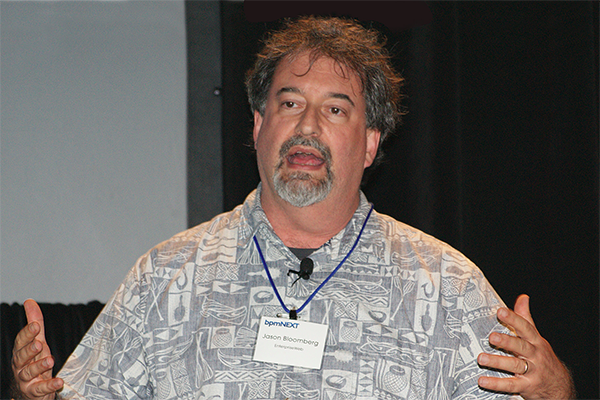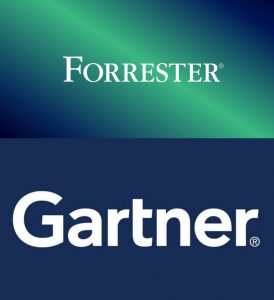Search for an answer to a question, and Google will give you hundreds of them.
But you don’t need a lot of answers. Do You?
In an age where information is freely flowing and everyone’s got a glass to share, finding the right answer can seem challenging.
In the past few years, Low-code/ No-Code development (LCNC) has garnered a lot of attention from organizations looking to become more agile and responsive to market dynamics and customer needs. In fact, Forrester predicts low-code as one of the top emerging technologies to watch through 2020.
If you are looking for LCNC News, conference coverage, and groundbreaking innovation, there are experts to watch. From technology leaders, Forbes contributors to eminent founders here are 5 renowned influencers (in no particular order) you should follow to stay abreast of the latest happenings in the LCNC sphere.
Jason Bloomberg

According to Forbes bio, Jason Bloomberg is a leading IT analyst, keynote speaker, Forbes contributor, and a leading expert in the sphere of enterprise technology and digital transformation.
Jason is also the founder of Intellyx, an advisory firm focused on empowering professionals to achieve Agile Digital Transformation.
Mr. Bloomberg’s articles in Forbes have been viewed by more than 100,000 readers. During his career, he has published over 1,500 articles (over 270 for Forbes alone), spoken at over 450 conferences and webinars, and he has been quoted in the press and blogosphere over 2,300 times.
Mr. Bloomberg has also co-authored five books: Low-Code for Dummies (Wiley, 2019), The Agile Architecture Revolution (Wiley, 2013), Service Orient or Be Doomed! How Service Orientation Will Change Your Business (Wiley, 2006), XML and Web Services Unleashed (SAMS Publishing, 2002), and Web Page Scripting Techniques (Hayden Books, 1996).
Quotes:
“As companies proceed with their digital transformations, software becomes increasingly strategic and pervasive – which means they need more of it. Lots more.”
Don’t Let Your Application Backlog Sink Your Digital Transformation
“Because low-code platforms focus on giving professional developers the ability to build applications more quickly while minimizing the need to hand-code, traditional development backlogs become less about features and tasks and more about applications – improving both the productivity and morale of the developers as well as the customer-centricity of the apps themselves.”
Don’t Let Your Application Backlog Sink Your Digital Transformation
Where you can follow him: Twitter, Linkedin
George Westerman

A Senior Lecturer at MIT School of Sloan School of Management and Research Scientist for Workplace Learning in the MIT Jameel World Education Lab, George Westerman has a diverse experience of 17 years working at MIT, where he has worked at the intersection of executive leadership and technology innovation.
He works frequently with senior management teams and industry groups around the world. Prior to earning a Doctorate from Harvard Business School, he gained more than 13 years of experience in product development and technology leadership roles.
Quotes
“When digital transformation is done right, it’s like a caterpillar turning into a butterfly, but when done wrong, all you have is a really fast caterpillar.”George Westerman Quotes Goodreads.com
“technology leadership is not just about IT leaders, although they are part it. It’s not just about technical skills, although they’re essential. It’s about merging the skills and perspectives of business and IT leaders so that they drive transformation together.”
Where to Follow Him: Twitter, Linkedin
John Rymer

A graduate from Ohio University with a B.S. in journalism, Joh Rymer is a principal analyst at Forrester. Forrester is one of America’s top analyst firms and is recognized for defining much of the low-code industry.
According to his Forrester bio, Rymer is an “authority on the enterprise strategies of IBM, Microsoft, and Oracle and contributes to Forrester’s coverage of low-code application platforms and business rules platforms.” Rymer’s market analysis has been featured in a number of publications including TechRepublic, VentureBeat, TechCrunch, and Fortune.
Quotes
” Just because you can build something doesn’t necessarily mean that you should. Maybe you should reuse something that somebody already built or take something somebody already built and customize it a little bit to meet your needs.”
How To Choose a Low Code Platform: 3 Tips
“Like any product, Low Code has its strengths and weaknesses. In the case of low-code platforms, users can face challenges of scale, while companies must grapple with the possibility of vendor-lock in. While some of the larger players in the low-code space can point to large application deployments — mission-critical products with thousands of global users — not all the companies offering low-code solutions are equipped. “
Low code 101 and the rise of drag-and-drop programming to support scale
Where you can follow him: Twitter, Linkedin
Forester and Gartner

Ok, so these aren’t human entries like others, but are renowned consulting and research firms that continue to dominate conversations on low code no code space.
Forrester is widely known for its enlightening analysis and evaluation of existing low code platforms. It is interesting to note that Forrester is a pioneer to define the term ‘low code’ in 2014 as a part of establishing it as a distinct category for evaluation.
The Forrester New Wave, a comprehensive industry report, examines the top 13 low-code solution providers in the U.S. market. These reports use a 10-category scoring process, including its user interface development, data management, digital process automation, reporting tools, cloud platform features, and many more such parameters.
On the other hand, Gartner, the second leading name in the low code world is an IT research and advisory firm, offers an in-depth look at low code’s impact on businesses. Every year, Gartner releases its “Magic Quadrant” report, which analyzes the high productivity building of applications, including mobile apps. One thing to be aware of is that Gartner utilizes its own definitions of low code and no-code, meaning its results while sharing some similarities with Forrester’s report, is fundamentally different.
Quotes:
“High-productivity application platform as a service continues to increase its footprint across enterprise IT as businesses juggle the demand for applications, digital business requirements and skill set challenges.”
2018 Magic Quadrant for Enterprise High-Productivity Application Platform as a Service Report
“When business people can’t get the automation they need to carry out their missions, they build software tools and apps themselves. They have been doing so for decades, typically relying on unmanaged spreadsheets, desktop databases, and, more recently, collaboration and website tools. Low-code development platforms for business developers offer a managed and more productive environment for this inevitable software-delivery activity, with tools designed specifically for business experts rather than professional software developers.”
The Forrester New Wave™: Low-Code Platforms For Business Developers, Q4 2017
Where you can follow them:
Forrester: Twitter, LinkedIn
Gartner: Twitter, Linkedin
Begin Your No Code Journey With Us…
Tigersheet is a uber-fast modern-day no-code platform that can help streamline business processes in quick and easy steps. The intuitive drag and drop interface allows users with zero coding knowledge to create workflows and share them with your employees. Follow us on our social media channels Twitter and LinkedIn to get notifications on all updates.
TRY Tigersheet for FREE and witness the change in your organization today!
